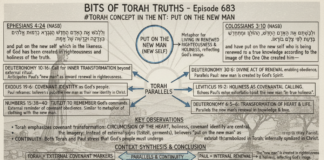[youtube url=”https://www.youtube.com/watch?v=On4iVDeEKIY&feature=youtu.be”]
In this week’s study from Tehillim / Psalms 101:1-8, the Psalm opens saying, א לְדָוִד מִזְמוֹר חֶסֶד-וּמִשְׁפָּט אָשִׁירָה לְךָ יְהֹוָה אֲזַמֵּרָה: A Psalm of David 101:1 I will sing of lovingkindness and justice, To You, O Lord, I will sing praises. (NASB) David speaks of singing of the grace (חֶסֶד) of God. He continues saying, ב אַשְֹכִּילָה | בְּדֶרֶךְ תָּמִים מָתַי תָּבוֹא אֵלָי אֶתְהַלֵּךְ בְּתָם-לְבָבִי בְּקֶרֶב בֵּיתִי: ג לֹא-אָשִׁית | לְנֶגֶד עֵינַי דְּבַר-בְּלִיָּעַל עֲשֹה-סֵטִים שָֹנֵאתִי לֹא יִדְבַּק בִּי: 101:2 I will give heed to the blameless way. When will You come to me? I will walk within my house in the integrity of my heart. 101:3 I will set no worthless thing before my eyes; I hate the work of those who fall away; It shall not fasten its grip on me. (NASB) When he says that he will set no worthless thing before his eyes, what do you think he was referring to? Idols or prostitutes? In ancient times, what did David consider worthless things that would go before his eyes? He seems to define what he meant saying, ד לֵבָב עִקֵּשׁ יָסוּר מִמֶּנִּי רָע לֹא אֵדָע: ה מְלָושְׁנִי [מְלָשְׁנִי] בַסֵּתֶר | רֵעֵהוּ אוֹתוֹ אַצְמִית גְּבַהּ-עֵינַיִם וּרְחַב לֵבָב אֹתוֹ לֹא אוּכָל: 101:4 A perverse heart shall depart from me; I will know no evil. 101:5 Whoever secretly slanders his neighbor, him I will destroy; No one who has a haughty look and an arrogant heart will I endure. (NASB) He speaks of the perverse heart, it seems clear what he is speaking of. Mishley / Provers 11:20 states, 11:20 The perverse in heart are an abomination to the LORD, But the blameless in their walk are His delight. (NASB) It is interesting how the deceitfulness of the heart in the sense of the perverse heart, what we look at, men make light of giving short weight or measure to the heart. The heart is a secret place and hidden from the sight of men, however the thoughts of the heart appear to be capable of violating the Torah of God, and so becoming an abomination to the Lord. Read more here: tehillim-101-part1









